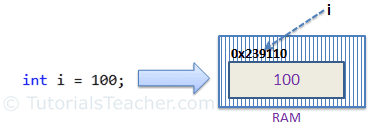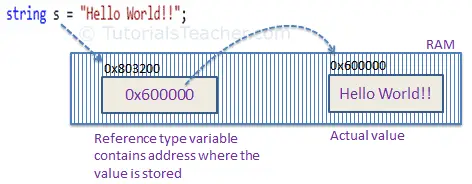CSharp Data Types
Value Types, Reference Types, and Pointer Types
In CSharp, these data types are categorized based on how they store their value in the memory. CSharp includes the following categories of data types:
- Value type
- Reference type
- Pointer type
Value Type
A data type is a value type if it holds a data value within its own memory space. It means the variables of these data types directly contain values.
TIP: All the value types derive from System.ValueType, which in-turn, derives from System.Object.
For example, consider integer variable int i = 100;
The system stores 100 in the memory space allocated for the variable i. The following image illustrates how 100 is stored at some hypothetical location in the memory (0x239110) for ‘i’:
The following data types are all of value type:
- bool
- byte
- char
- decimal
- double
- enum
- float
- int
- long
- sbyte
- short
- struct
- uint
- ulong
- ushort
Passing Value Type Variables
When you pass a value-type variable from one method to another, the system creates a separate copy of a variable in another method. If value got changed in the one method, it wouldn’t affect the variable in another method.
Example: Passing Value Type Variables
static void ChangeValue(int x)
{
x = 200;
Console.WriteLine(x); // 200
}
static void Main(string[] args)
{
int i = 100;
Console.WriteLine(i); // 100
ChangeValue(i);
Console.WriteLine(i); // 100
}
In the above example, variable i in the Main() method remains unchanged even after we pass it to the ChangeValue() method and change it’s value there.
Reference Type
Unlike value types, a reference type doesn’t store its value directly. Instead, it stores the address where the value is being stored. In other words, a reference type contains a pointer to another memory location that holds the data.
For example, consider the following string variable:
string s = "Hello World!!";
The following image shows how the system allocates the memory for the above string variable.
As you can see in the above image, the system selects a random location in memory (0x803200) for the variable s. The value of a variable s is 0x600000, which is the memory address of the actual data value. Thus, reference type stores the address of the location where the actual value is stored instead of the value itself.
The followings are reference type data types:
- String
- Arrays
- Class
- Delegate
Passing Reference Type Variables
When you pass a reference type variable from one method to another, it doesn’t create a new copy; instead, it passes the variable’s address. So, If we change the value of a variable in a method, it will also be reflected in the calling method.
Example: Passing Reference Type Variable
static void ChangeReferenceType(Student std2)
{
std2.StudentName = "Steve";
}
static void Main(string[] args)
{
Student std1 = new Student();
std1.StudentName = "Bill";
ChangeReferenceType(std1);
Console.WriteLine(std1.StudentName);
}
Output: Steve
In the above example, we pass the Student object std1 to the ChangeReferenceType() method. Here, it actually pass the memory address of std1. Thus, when the ChangeReferenceType() method changes StudentName, it is actually changing StudentName of std1 object, because std1 and std2 are both pointing to the same address in memory.
Null
The default value of a reference type variable is null when they are not initialized. Null means not refering to any object.
A value type variable cannot be null because it holds value, not a memory address. CSharp 2.0 introduced nullable types, using which you can assign null to a value type variable or declare a value type variable without assigning a value to it.
TutorialsTeacher. (2020). Value Type and Reference Type. Retrieved November 12, 2020, from https://www.tutorialsteacher.com/csharp/csharp-value-type-and-reference-type
Pointer Types
A pointer type declaration takes one of the following forms:
CSharp
type* identifier;
void* identifier; //allowed but not recommended
The type specified before the * in a pointer type is called the referent type. Only an unmanaged type can be a referent type.
Pointer types do not inherit from object and no conversions exist between pointer types and object. Also, boxing and unboxing do not support pointers. However, you can convert between different pointer types and between pointer types and integral types.
When you declare multiple pointers in the same declaration, the asterisk (*) is written together with the underlying type only; it is not used as a prefix to each pointer name. For example:
CSharp
int* p1, p2, p3; // Ok
int *p1, *p2, *p3; // Invalid in CSharp
A pointer cannot point to a reference or to a struct that contains references, because an object reference can be garbage collected even if a pointer is pointing to it. The garbage collector does not keep track of whether an object is being pointed to by any pointer types.


